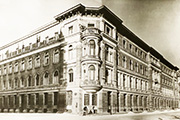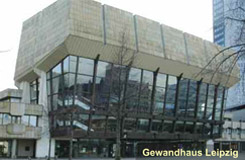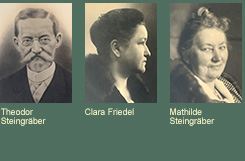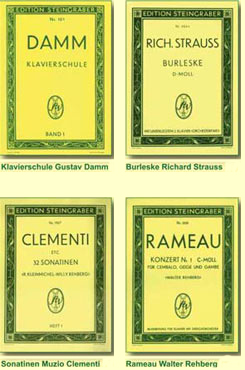History of Steingräber Verlag
Theodor Leberecht Steingräber, born on 25 January 1830, son of Gottlieb Steingräber, founder of the pianoforte manufacturing company Steingräber in Bayreuth, Germany, www.steingraeber.de wrote for his daughters Clara and Mathilde under the pseudonym Gustav Damm the piano method of the same name. This piano method had such a resounding success that since its first publication in 1868 it has seen hundreds of editions well into the 20th century and it is still reprinted today. It was translated into many languages, for instance English, French and Russian.
Buoyed by this success, Th. Steingräber founded, on 1 January 1878, the music publishing house in Hannover. In 1890, the publishing house was moved to Leipzig, the city of music publishers.
With its excellent editions of classical works the publishing house achieved worldwide renown.
In May 1893, Walter Friedel, publishing agent and bookseller and husband of Clara, became a partner in the business.
Contacts with young composers during this period resulted in the publication of a number of their works by Steingräber. The Burleske in d minor for piano and orchestra composed in 1885/86 by Richard Strauss appeared in 1885/86 and the Serenade in E flat Major for 5-voice string orchestra by Ermanno Wolf-Ferrari in 1900.
After Theoder Steingräber’s death in 1904 his two daughters Mathilde Steingräber and Clara Friedel née Steingräber became co-partners in the publishing house.
Walter Friedel died in 1916. From 1916 until 1926 Georg Heinrich, the son-in-law of his wife Clara Friedel, took over the management of the publishing house for the two owners.
Among the significant publications in this period were the Serenade op. 20 for nine wind instruments by Henri Marteau (1922) and, in 1923, the opera „Sakhara“ by Simon Bucharoff (1881 – 1955), which was premiered 1924 in Frankfurt am Main.
Mathilde Steingräber died in 1945.
During the Second World War the publishing house and the affiliated enterprises, the printing and binding companies Ludwig Fries and Henrich & Scheffel, burned to the ground during an air raid on Leipzig in December 1943. Reconstruction after the war was very difficult.
The publishing house in 1928
After the death of Clara Friedel, née Steingräber on 31  January 1953, the publishing house passed into the ownership of the grand-daughter Hildegard Pilz, née Heinrich, who moved the enterprise from Leipzig via Frankfurt to Offenbach in the same year, where the the enterprise has been based ever since.
January 1953, the publishing house passed into the ownership of the grand-daughter Hildegard Pilz, née Heinrich, who moved the enterprise from Leipzig via Frankfurt to Offenbach in the same year, where the the enterprise has been based ever since.
On 9 August 2009, Hildegard Pilz passed the publishing house on to her daughter, Florentine Schröder née Pilz, who is now sole proprietress of the publishing house.
Since its very beginning, the publishing house devoted itself to the publication of musical material for students and instrumental training. With the ‚Damm Klavierschule’ it has made a highly respected name for itself in music education.
In addition, the Steingräber Verlag offers a wide range of instructional material by well- known teachers such as Frey, Pischna, Schmitt and Schütze, as well as adaptations of the sonatinas of Muzio Clementi by R. Kleinmichel and Willy Rehberg.
Our main editioral areas are therefore still publications for students and instrumental teaching as well as classical music and adaptations of classical repertoire.
The publishing house has always been able to attract outstanding musicians as collaborators, such as the renowned Swiss music professor, pianist and composer Walter Rehberg (1900-1957). He arranged concertos for piano and string orchestra by J. Ph. Rameau, and made a complete revision of Schubert’s piano sonatas, partly completing them and adding fingerings.
Numerous works by Henri Marteau (1874-1934), French violinist and composer, have appeared in the Steingräber Verlag together with around a hundred of his adaptations of the classical violin repertoire.
It was in 1909 that Marteau got to know Walter Friedel, director of the Steingräber Verlag, as an appreciative publisher, who had such high regard for his qualities as an educator, that he offered him the assignment for this comprehensive revision. The enormous task would keep him occupied for the rest of his life.
One of the most important adaptations, if not the most important, was the edition of the six solo sonatas by J. S. Bach, which encapsulated the essence of many years of experience of research and public performance.
After the end of the war, in 1919, the Steingräber Verlag resumed contact with Marteau.
In Lichtenberg in Franconia, where Marteau lived, the composer received a visit from the son-in-law of the deceased Walter Friedel, Georg Heinrich, architect and builder by profession, now director of the publishing house, accompanied by his musical advisor, Kapellmeister Gustav Groschwitz.
For the composer it constituted a gratifying appreciation of his art that the Edition Steingräber took on his works written during the war and immediately proceeded to print them.
Since 1982 the Marteau House in Lichtenberg in Upper Franconia has become a musical meeting place dedicated to continuing the intentions of the composer.
In the second century of its existence, the Steingräber Verlag wishes to continue this tradition and set an example with the current edition as well as with reprints and new editions.


